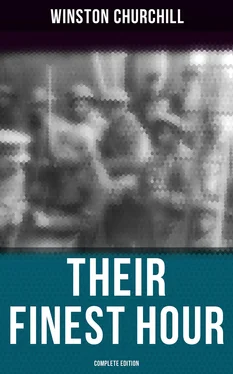After some early changes almost equal stability was preserved in the Chiefs of Staff Committee. On the expiry of his term as Chief of the Air Staff, in September 1940, Air Marshal Newall became Governor-General of New Zealand, and was succeeded by Air Marshal Portal, who was the accepted star of the Air Force. Portal remained with me throughout the war. Sir John Dill, who had succeeded General Ironside in May 1940, remained C.I.G.S. until he accompanied me to Washington in December 1941. I then made him my personal Military Representative with the President and head of our Joint Staff Mission. His relations with General Marshall, Chief of Staff of the United States Army, became a priceless link in all our business, and when he died in harness some two years later he was accorded the unique honour of a resting-place in Arlington Cemetery, the Valhalla hitherto reserved exclusively for American warriors. He was succeeded as C.I.G.S. by Sir Alan Brooke, who stayed with me till the end.
From 1941, for nearly four years, the early part of which was passed in much misfortune and disappointment, the only change made in this small band either among the Chiefs or in the Defence staff was due to the death in harness of Admiral Pound. This may well be a record in British military history. A similar degree of continuity was achieved by President Roosevelt in his own circle. The United States Chiefs of Staff—General Marshall, Admiral King, and General Arnold, subsequently joined by Admiral Leahy—started together on the American entry into the war, and were never changed. As both the British and Americans presently formed the Combined Chiefs of Staff Committee this was an inestimable advantage for all. Nothing like it between allies has ever been known before.
I cannot say that we never differed among ourselves even at home, but a kind of understanding grew up between me and the British Chiefs of Staff that we should convince and persuade rather than try to overrule each other. This was of course helped by the fact that we spoke the same technical language, and possessed a large common body of military doctrine and war experience. In this ever-changing scene we moved as one, and the War Cabinet clothed us with ever more discretion, and sustained us with unwearied and unflinching constancy. There was no division, as in the previous war, between politicians and soldiers, between the “Frocks” and the “Brass Hats”—odious terms which darkened counsel. We came very close together indeed, and friendships were formed which I believe were deeply valued.
The efficiency of a war Administration depends mainly upon whether decisions emanating from the highest approved authority are in fact strictly, faithfully, and punctually obeyed. This we achieved in Britain in this time of crisis owing to the intense fidelity, comprehension, and whole-hearted resolve of the War Cabinet upon the essential purpose to which we had devoted ourselves. According to the directions given, ships, troops, and aeroplanes moved, and the wheels of factories spun. By all these processes, and by the confidence, indulgence, and loyalty by which I was upborne, I was soon able to give an integral direction to almost every aspect of the war. This was really necessary, because times were so very bad. The method was accepted because everyone realised how near were death and ruin. Not only individual death, which is the universal experience, stood near, but, incomparably more commanding, the life of Britain, her message, and her glory.
***
Any account of the methods of government which developed under the National Coalition would be incomplete without an explanation of the series of personal messages which I sent to the President of the United States and the heads of other foreign countries and the Dominions Governments. This correspondence must be described. Having obtained from the Cabinet any specific decisions required on policy, I composed and dictated these documents myself, for the most part on the basis that they were intimate and informal correspondence with friends and fellow-workers. One can usually put one’s thoughts better in one’s own words. It was only occasionally that I read the text to the Cabinet beforehand. Knowing their views, I used the ease and freedom needed for the doing of my work. I was of course hand in-glove with the Foreign Secretary and his department, and any differences of view were settled together. I circulated these telegrams, in some cases after they had been sent, to the principal members of the War Cabinet, and, where he was concerned, to the Dominions Secretary. Before dispatching them I of course had my points and facts checked departmentally, and nearly all military messages passed through Ismay’s hands to the Chiefs of Staff. This correspondence in no way ran counter to the official communications or the work of the Ambassadors. It became however in fact the channel of much vital business, and played a part in my conduct of the war not less, and sometimes even more important than my duties as Minister of Defence.
The very select circle, who were entirely free to express their opinion, were almost invariably content with the drafts and gave me an increasing measure of confidence. Differences with American authorities for instance, insuperable at the second level, were settled often in a few hours by direct contact at the top. Indeed, as time went on the efficacy of this top-level transaction of business was so apparent that I had to be careful not to let it become a vehicle for ordinary departmental affairs. I had repeatedly to refuse the requests of my colleagues to address the President personally on important matters of detail. Had these intruded unduly upon the personal correspondence they would soon have destroyed its privacy and consequently its value.
My relations with the President gradually became so close that the chief business between our two countries was virtually conducted by these personal interchanges between him and me. In this way our perfect understanding was gained. As Head of the State as well as Head of the Government, Roosevelt spoke and acted with authority in every sphere; and, carrying the War Cabinet with me, I represented Great Britain with almost equal latitude. Thus a very high degree of concert was obtained, and the saving in time and the reduction in the number of people informed were both invaluable. I sent my cables to the American Embassy in London, which was in direct touch with the President at the White House through special coding machines. The speed with which answers were received and things settled was aided by clock-time. Any message which I prepared in the evening, at night, or even up to two o’clock in the morning, would reach the President before he went to bed, and very often his answer would come back to me when I woke the next morning. In all I sent him nine hundred and fifty messages, and received about eight hundred in reply. I felt I was in contact with a very great man, who was also a warm-hearted friend and the foremost champion of the high causes which we served.
***
The Cabinet being favourable to my trying to obtain destroyers from the American Government, I drafted during the afternoon of May 15 my first message to President Roosevelt since I became Prime Minister. To preserve the informality of our correspondence signed myself “Former Naval Person”, and to this fancy I adhered almost without exception throughout the war.
Although I have changed my office, I am sure you would not wish me to discontinue our intimate private correspondence. As you are no doubt aware, the scene has darkened swiftly. The enemy have a marked preponderance in the air, and their new technique is making a deep impression upon the French. I think myself the battle on land has only just begun, and I should like to see the masses engage. Up to the present Hitler is working with specialised units in tanks and air. The small countries are simply smashed up, one by one, like matchwood. We must expect, though it is not yet certain, that Mussolini will hurry in to share the loot of civilisation. We expect to be attacked here ourselves, both from the air and by parachute and air-borne troops, in the near future, and are getting ready for them. If necessary, we shall continue the war alone, and we are not afraid of that.
Читать дальше











